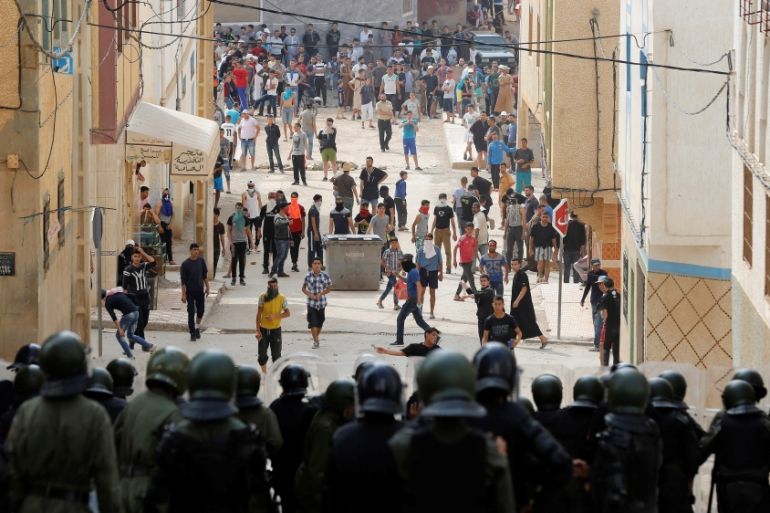Morocco’s al-Hoceima gears up for ‘million-man march’
The steadily growing popular movement in Morocco’s northern Rif region is planning a massive rally for Thursday.

Protesters in the Moroccan city of al-Hoceima are gearing up for what they hope to be a million-man march on Thursday, in the latest chapter of a steadily growing popular movement known simply as “Hirak” in the country’s northern Rif region.
Spurred into action after the murder of a fishmonger crushed to death by local security forces in late October, the Rif-based popular movement has come to symbolise resentment towards a history of state neglect and violence in the poor coastal area.
Among Hirak’s demands are calls for a serious inquiry into the death of Mohcine Fikri, the fish seller, a release of political prisoners and the construction of universities, hospitals and libraries in Morocco’s Rif.
|
|
Protest organisers anticipate the march to be the largest demonstration since a solidarity march in the capital city Rabat last month drew more than 100,000 protesters, the most since the 2011 regional uprisings.
Maati Monjib, history professor at Mohamed V University and President of pro-democracy group Freedom Now, told Al Jazeera that the Rif area has had a long history of protests.
“Since the colonial period, the region has had a history of resistance first to Spanish colonialism and later to the Moroccan monarchy. An autonomous Republic of the Rif was founded in 1923 by independence leader Abdelkrim al-Khatabi but was later defeated by a coalition of French and Spanish forces.”
Few developmental projects have reached the Rif since. Neoliberal reforms in the 1970s and 1990s by the International Monetary Fund and the implementation of the Barcelona Process further disenfranchised the area’s working-class people, leading to deep mistrust of the central government.
The current Hirak – or movement – gained further traction in recent months after the arrest of popular leader Nasser Zefzafi, along with 150 fellow activists, led to solidarity marches across the country.
Zefzafi, an unemployed resident and activist in al-Hoceima, was arrested after disrupting a Friday sermon to ask: “Are these mosques of God or mosques of the State?” His interruption was a response to state-sponsored sermons that blamed young protesters for causing division.
As nationwide protests increased throughout the month of Ramadan earlier this summer, and security forces began to crack down on demonstrators, calls to end militarisation of the Rif and for the release of political prisoners were added to the list of demands.
OPINION: Making sense of recent protests in Morocco
The Rif is home to one of three major Amazigh ethno-linguistic groups in Morocco that are considered the native inhabitants of the present-day Maghreb. About 50 percent of Moroccans speak a form of the Amazigh language.
For Meryam Demnati of the Observatory of Amazigh Rights and Liberty (OARL), the Hirak movement must be understood as part of the broader regional Amazigh movement, as well as the latest iteration of the Arab Spring.
Known in Morocco as the 20th February Movement, it led mass protests in 2011 which led to the establishment of a new constitution and the recognition of Amazigh as an official national language.
Monjib agrees. He believes that while demands in al-Hoceima are often local, there are many others that are general to the whole country.
“The regime can’t respond to the demands of the Riffis without responding to all the pro-democratic demands in Morocco,” says Monjib.
“For example, we are asking for the end of corruption and despotism. This can’t be granted only for al-Hoceima or the Rif. It must be done for all Moroccans or no one.”
|
|
The Rif movement has also had a significant female leadership base, Demnati explains. “The women, who had not seen much at the beginning [this region being very conservative], went out en masse to demand the release of the prisoners.”
When young activist-singer Silya Ziani was arrested one week after Zefzafi, the OARL was among those campaigning for her release.
For Monjib, Thursday’s march can be a real opportunity to create change. “If the movement continues, if it can continue for months and months, and because there is a nationwide movement of solidarity, the regime will be obliged to respond to the local demands as well as the pro-democracy demands.”
Riffi political prisoners detained both in al-Hoceima and Casablanca announced on Monday the beginning of a 72-hour hunger strike until their release and until charges are dropped.
Authorities in al-Hoceima earlier this week officially banned Thursday’s march. But organisers responded with renewed calls for mass participation in the al-Hoceima March and in solidarity marches across the country.